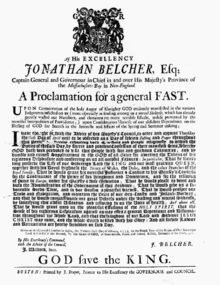Fast day

Fast Day was a holiday observed in some parts of the United States between 1670 and 1991.
"A day of public fasting and prayer," it was traditionally observed in the New England states. It had its origin in days of prayer and repentance proclaimed in the early days of the American colonies by Royal Governors, often before the spring planting (cf. Rogation Days). It was observed by church attendance, fasting, and abstinence from secular activities. The earliest known fast day was proclaimed in Boston on September 8, 1670.
Fast day had lost its significance as a religious holiday by the late 19th century. It was abolished by Massachusetts in 1894 (being replaced with Patriots' Day) and shortly thereafter by Maine, which also adopted Patriots' Day. It continued in New Hampshire until 1991, signifying only the opening of the summer tourist season; the April holiday was dropped and replaced with the January Civil Rights Day in 1991, and then in 1999, Martin Luther King, Jr. Day.[1]